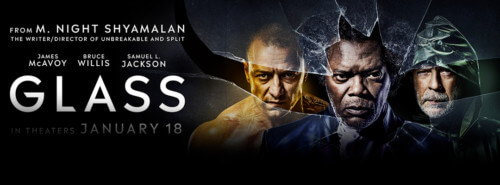
Glass (2019)
Director: M. Night Shyamalan
Screenwriter: M. Night Shyamalan
Starring: James McAvoy, Bruce Willis, Samuel L. Jackson, Sarah Paulson, Anya Taylor-Joy, Spencer Treat Clark, Charlayne Woodard
M. Night Shyamalan has finally brought us the concluding story for what is now known as the ‘Eastrail 177 Trilogy’. This superhero-thriller has been highly anticipated by many since its predecessor, Split, was so well received just two years ago.
For those who are unfamiliar with the series, both Unbreakable and Split have so far introduced us to Mr Glass (Jackson) and Kevin (McAvoy), two people who believe they are superheroes and have special powers. In Unbreakable (2000), a train crash involving the Eastrail 177 killed all passengers but one, David Dunn (Willis). After hearing about Mr Glass’ interest in others like him, David approached him about his ‘powers’, resulting in David finding out that Mr Glass was not one of the good guys. The only connection to the series in Split is a brief cameo from Willis as David Dunn.
Which brings us to Glass.
Glass combines all three of the characters’ stories with the help of Doctor Ellie Staple (Paulson), a psychiatrist who specialises in those who believe they are superheroes. Mr Glass believes that the triad’s destiny is to fight as a comic book would portray them to, in front of the whole world in a battle that ends in terrifying destruction. His intense need for belief from others is ultimately what may end up destroying all three of them or, worse, the world…
Following its official release on January 18th, Glass has smashed the UK box office with a debut of over £3.3m, pushing past Mary Queen of Scots for the top spot, already furthering the success of Split (which gained £2.56m). Although Golden Globe winning films and the recently announced Oscars nominations have dominated the box office in recent weeks, such as The Favourite and Mary Poppins Returns, Glass is looking to be quite a success for those cinema-goers who prefer a mixed palette of genres.
To this point, Glass indisputably has countless strengths that work both in the standalone sense and as a sequel to end a trilogy. It becomes clear quite early on that the main reason for this film was to conclude the story and connect the three main characters in a more interwoven fashion, an aspect of the piece that was well thought out and featured some trademark Shyamalan plot developments that revealed themselves at just the right moments.
No spoilers here, but let’s just say that it’s not called the Eastrail 177 Trilogy for nothing.
M. Night Shyamalan’s writing wasn’t spectacular but it flowed in such a way that was gripping and ultimately created a decent story. At times, things felt messy and thrown together, but it all added to the tension of the three characters, McAvoy’s twenty four split personalities in particular. The more stress the character was under, the more personalities were introduced, and although these came very quickly, it displayed just how fantastic James McAvoy is as a method actor – which is incredibly gratifying to fans of his original work in Split.
In Glass, there are key points in the film where McAvoy’s acting is second-to-none. Not only do we see a change in the way he attempts to dress, but in his facial expressions, body language and mannerisms, which he has down to a tee for all the personalities we see. In one five-minute scene, McAvoy switches between each identity effortlessly, yet clearly, in what is a truly gripping piece of acting worthy of the hype. To this point, Glass presents much more of the central personality of McAvoy’s character Kevin, as Casey (Taylor-Joy) attempts to help him confront his identities and let him “take the light”. It’s a grounding technique used by Shyamalan to keep the audience on its toes and, along with further developments to the personality of The Beast – an amalgamation of animals that Kevin looked after at his old job at Philadelphia Zoo – truly displays the effort and passion of McAvoy’s performance.
It’s McAvoy who makes this film so brilliant.
Conclusively, Glass is an emotional, heartfelt and personal tribute to those who have experienced trauma or felt like an outsider within their own comforts. An underlying message of Glass, and the series as a whole, is true individualism, and the expression that of one’s self is never worthless or lost. A memorable and moving quote from Split – “the broken are the more evolved” – is one that has stuck with many for the two years that have passed since its release and was thankfully reinforced in its meaning in Glass.
This may not end up being one the best films of 2019, or even of M. Night Shyamalan’s career, but its message, its fascinating story and incredible performances, give it a good chance of becoming an integral and enjoyable part of a now certifiably classic thriller franchise.
17/24

